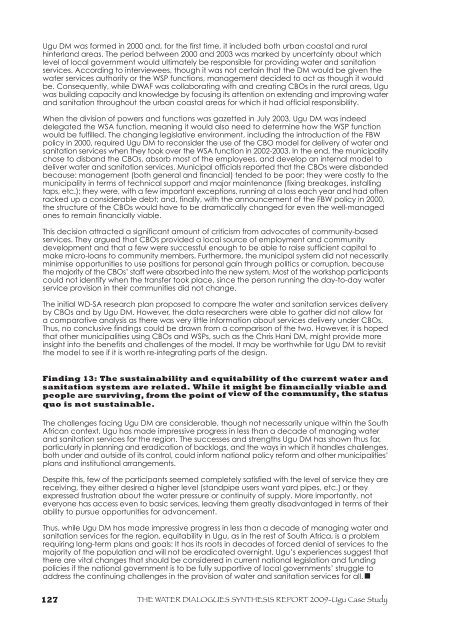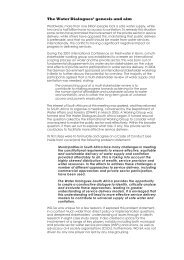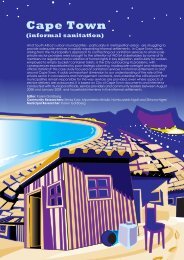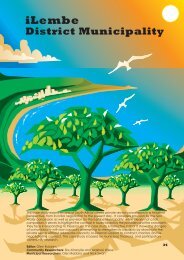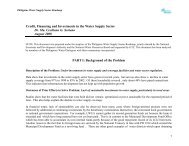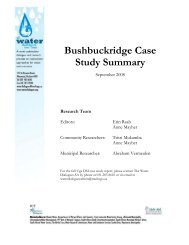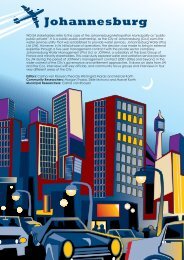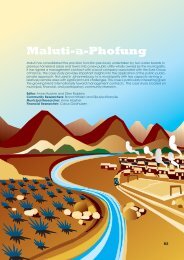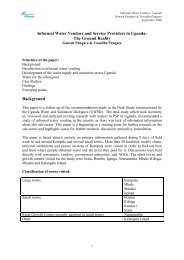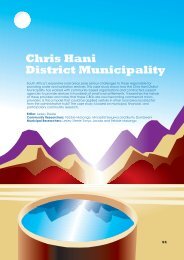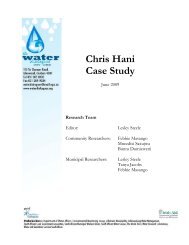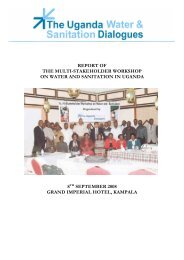Ugu Case Study Summary - The Water Dialogues
Ugu Case Study Summary - The Water Dialogues
Ugu Case Study Summary - The Water Dialogues
You also want an ePaper? Increase the reach of your titles
YUMPU automatically turns print PDFs into web optimized ePapers that Google loves.
<strong>Ugu</strong> DM was formed in 2000 and, for the first time, it included both urban coastal and rural<br />
hinterland areas. <strong>The</strong> period between 2000 and 2003 was marked by uncertainty about which<br />
level of local government would ultimately be responsible for providing water and sanitation<br />
services. According to interviewees, though it was not certain that the DM would be given the<br />
water services authority or the WSP functions, management decided to act as though it would<br />
be. Consequently, while DWAF was collaborating with and creating CBOs in the rural areas, <strong>Ugu</strong><br />
was building capacity and knowledge by focusing its attention on extending and improving water<br />
and sanitation throughout the urban coastal areas for which it had official responsibility.<br />
When the division of powers and functions was gazetted in July 2003, <strong>Ugu</strong> DM was indeed<br />
delegated the WSA function, meaning it would also need to determine how the WSP function<br />
would be fulfilled. <strong>The</strong> changing legislative environment, including the introduction of the FBW<br />
policy in 2000, required <strong>Ugu</strong> DM to reconsider the use of the CBO model for delivery of water and<br />
sanitation services when they took over the WSA function in 2002-2003. In the end, the municipality<br />
chose to disband the CBOs, absorb most of the employees, and develop an internal model to<br />
deliver water and sanitation services. Municipal officials reported that the CBOs were disbanded<br />
because: management (both general and financial) tended to be poor; they were costly to the<br />
municipality in terms of technical support and major maintenance (fixing breakages, installing<br />
taps, etc.); they were, with a few important exceptions, running at a loss each year and had often<br />
racked up a considerable debt; and, finally, with the announcement of the FBW policy in 2000,<br />
the structure of the CBOs would have to be dramatically changed for even the well-managed<br />
ones to remain financially viable.<br />
This decision attracted a significant amount of criticism from advocates of community-based<br />
services. <strong>The</strong>y argued that CBOs provided a local source of employment and community<br />
development and that a few were successful enough to be able to raise sufficient capital to<br />
make micro-loans to community members. Furthermore, the municipal system did not necessarily<br />
minimise opportunities to use positions for personal gain through politics or corruption, because<br />
the majority of the CBOs’ staff were absorbed into the new system. Most of the workshop participants<br />
could not identify when the transfer took place, since the person running the day-to-day water<br />
service provision in their communities did not change.<br />
<strong>The</strong> initial WD-SA research plan proposed to compare the water and sanitation services delivery<br />
by CBOs and by <strong>Ugu</strong> DM. However, the data researchers were able to gather did not allow for<br />
a comparative analysis as there was very little information about services delivery under CBOs.<br />
Thus, no conclusive findings could be drawn from a comparison of the two. However, it is hoped<br />
that other municipalities using CBOs and WSPs, such as the Chris Hani DM, might provide more<br />
insight into the benefits and challenges of the model. It may be worthwhile for <strong>Ugu</strong> DM to revisit<br />
the model to see if it is worth re-integrating parts of the design.<br />
Finding 13: <strong>The</strong> sustainability and equitability of the current water and<br />
sanitation system are related. While it might be financially viable and<br />
people are surviving, from the point of view of the community, the status<br />
quo is not sustainable.<br />
<strong>The</strong> challenges facing <strong>Ugu</strong> DM are considerable, though not necessarily unique within the South<br />
African context. <strong>Ugu</strong> has made impressive progress in less than a decade of managing water<br />
and sanitation services for the region. <strong>The</strong> successes and strengths <strong>Ugu</strong> DM has shown thus far,<br />
particularly in planning and eradication of backlogs, and the ways in which it handles challenges,<br />
both under and outside of its control, could inform national policy reform and other municipalities’<br />
plans and institutional arrangements.<br />
Despite this, few of the participants seemed completely satisfied with the level of service they are<br />
receiving, they either desired a higher level (standpipe users want yard pipes, etc.) or they<br />
expressed frustration about the water pressure or continuity of supply. More importantly, not<br />
everyone has access even to basic services, leaving them greatly disadvantaged in terms of their<br />
ability to pursue opportunities for advancement.<br />
Thus, while <strong>Ugu</strong> DM has made impressive progress in less than a decade of managing water and<br />
sanitation services for the region, equitability in <strong>Ugu</strong>, as in the rest of South Africa, is a problem<br />
requiring long-term plans and goals: It has its roots in decades of forced denial of services to the<br />
majority of the population and will not be eradicated overnight. <strong>Ugu</strong>’s experiences suggest that<br />
there are vital changes that should be considered in current national legislation and funding<br />
policies if the national government is to be fully supportive of local governments’ struggle to<br />
address the continuing challenges in the provision of water and sanitation services for all.<br />
127<br />
THE WATER DIALOGUES SYNTHESIS REPORT 2009-<strong>Ugu</strong> <strong>Case</strong> <strong>Study</strong>


